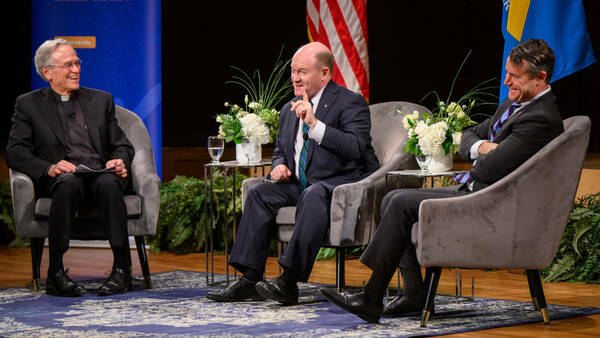
University of Notre Dame President Rev. John I. Jenkins, C.S.C., convened a fireside chat on Friday (Oct. 27) with U.S. Sens. Chris Coons and Todd Young on the importance of civic engagement and bipartisanship to overcome polarization and gridlock.
The conversation was part of the 2023-24 Notre Dame Forum on “The Future of Democracy,” which invites the Notre Dame community to reflect on the rising threats to global democracy and to consider how democracy can be reinvigorated in our nation and across the world to meet the challenges of our times.
Friday’s event featured two U.S. senators widely recognized for their commitments to bipartisanship, public service and effective policymaking.
“We are honored to have two distinguished senators joining us, representing both sides of the aisle, who have devoted their careers to civility, bipartisanship and effective policymaking,” Father Jenkins said in his introductory remarks. “The two of you, for my money, represent the best of government leadership today.”
Addressing recent political turmoil and gridlock on Capitol Hill, both senators cited a decline in personal connections and individual friendships within Congress among the causes of weakening institutional trust and effectiveness.
“Part of the answer is to invest time in getting to know each other,” Coons said. “Traveling together overseas, working out in the gym together, and actually getting to know each other’s families.”
He cited the weekly bipartisan prayer breakfast as one example of an important opportunity to “learn something about the humanity of another senator.”
The two senators also spoke about the importance of the institutional processes and structures governing Congress, and how a departure from the regular order of committee business and floor procedures undermines public trust and democratic functions.
“When you use the rules of Congress … and have open hearings and open debate … and you have a final vote at the end, you live with a work product which may not be 100 percent what you wanted, but it reflects the will of the American people through their elected representatives,” Young said. “That process not only worked but it significantly increased trust, at least for a short time period, in the institution.”
Both senators highlighted the many bipartisan legislative accomplishments Congress and the White House achieved in recent years, including efforts focused on infrastructure, postal reform and building safe communities, offering hope that polarization and gridlock in Washington are not inevitable.
Having recently returned from leading a bipartisan Senate delegation to the Middle East, Coons shared his concerns about the destabilizing impact political dysfunction at home may have abroad.
“We are the greatest force for good in human history, but this is a difficult and dangerous world,” he said. “There are billions of people whose human needs are unmet and who suffer under political systems dramatically different from our own and whose cultures and traditions are leading to conflicts that are tectonic globally.”
Coons went on to emphasize that, in the face of rising challenges, the U.S. must double down on its commitments to supporting democracy and human rights around the world.
“Our principal challenge now is not to give any truth to the argument (Chinese President) Xi Jingping is making around the world that our political dysfunction makes us a declining and weak power and that we cannot be counted on to fight for freedom around the world and to stand by our allies.”
The hour-long session included calls by both senators and Father Jenkins for citizens to take action to overcome disengagement and political polarization through getting to know neighbors, joining in local civic activities and creating spaces for robust dialogue.
“If you have a society that venerates fighting and not cooperation, that’s a real problem, ” Young said. “We need larger platforms to drive this message and we need people who support us in trying to cultivate this sort of atmosphere, and that’s what you’re doing by holding this forum.”
Notre Dame seniors Joy Agwu and Jacob Sherer also participated, asking the senators questions on mitigating the negative impacts of social media without compromising its ability to foster democracy and engagement and combating what the U.S. surgeon general called an “epidemic of loneliness” and its effect on society and democracy.
Father Jenkins concluded the event by thanking the senators and by amplifying their call to action: “Let’s not just listen, let’s act.”
Learn more about the 2023-24 Notre Dame Forum and watch the event’s livestream recording at forum.nd.edu.
Originally published by at news.nd.edu on October 30, 2023.